(完整版)小学英语动词过去式变化总结及练习题
小学一般过去时专项训练题及答案
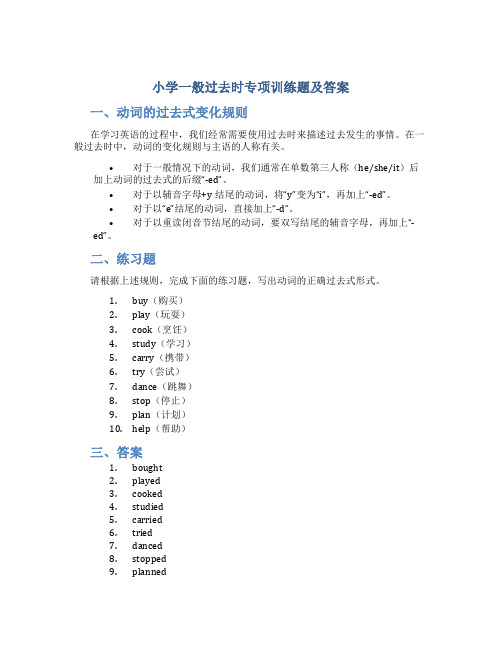
小学一般过去时专项训练题及答案一、动词的过去式变化规则在学习英语的过程中,我们经常需要使用过去时来描述过去发生的事情。
在一般过去时中,动词的变化规则与主语的人称有关。
•对于一般情况下的动词,我们通常在单数第三人称(he/she/it)后加上动词的过去式的后缀“-ed”。
•对于以辅音字母+y结尾的动词,将“y”变为“i”,再加上“-ed”。
•对于以“e”结尾的动词,直接加上“-d”。
•对于以重读闭音节结尾的动词,要双写结尾的辅音字母,再加上“-ed”。
二、练习题请根据上述规则,完成下面的练习题,写出动词的正确过去式形式。
1.buy(购买)2.play(玩耍)3.cook(烹饪)4.study(学习)5.carry(携带)6.try(尝试)7.dance(跳舞)8.stop(停止)9.plan(计划)10.help(帮助)三、答案1.bought2.played3.cooked4.studied5.carried6.tried7.danced8.stopped9.planned10.helped四、知识点总结通过以上练习题,我们了解了动词在一般过去时中的变化规则。
掌握这些规则对于正确使用过去时非常重要。
需要注意的是,一些不规则动词的过去式形式并不按照常规的规则来变换。
因此,在学习过程中,我们需要特别注意这些不规则动词,并进行针对性的练习和记忆。
希望以上的练习题对于小学生来说能够帮助加深对一般过去时的理解,提高正确使用过去时的能力。
祝大家学习进步!。
(译林版)小学英语动词过去式归类总结

小学英语动词过去式归类总结一、动词过去式的规则变化1.一般情况下,动词词尾加-ed如:work ---worked, play---played, want----wanted, act----acted2.以不发音的-e 结尾动词,动词词尾加-d 把动词原形最后的e去掉,加e/ed如:live---lived, move----moved, like--liked, hope---hoped二、动词过去式的不规则变化1. 把动词原形中的o改为a,变成过去式。
如:become—became, come—came2.把动词原形中的i改为a,变成过去式。
如:begin—began,drink—drank,give—gave,ring—rang,sing—sang,sit—sat,swim—swam3.把重读开音节中的i改为o,变成过去式。
如:drive—drove,ride—rode,win—won,write—wrote4.动词原形中的e改为o,变成过去式。
如:get—got,forget—forgot5.动词原形中的eep改为ept,变成过去式。
如:keep—kept,sleep—slept,sweep—swept6. 动词原形中的an改为oo,变成过去式。
如:stand—stood,understand—understood7.改动词原形中的aw /ow为ew,变成过去式。
如:draw—drew,grow—grew,know—knew,throw—threw(动词show除外,show—showed)8.动词原形中的eak改为oke,变成过去式。
如:break—broke,speak—spoke9.动词原形中的ell改为old,变成过去式。
如:sell—sold,tell—told10.以ought和aught结尾,且读音是[:t]的过去式。
如:bring—brought,buy—bought,think—thought,catch—caught,teach—taught11.以ould结尾且读音为[ud]的情态动词过去式。
动词过去式变化及练习题
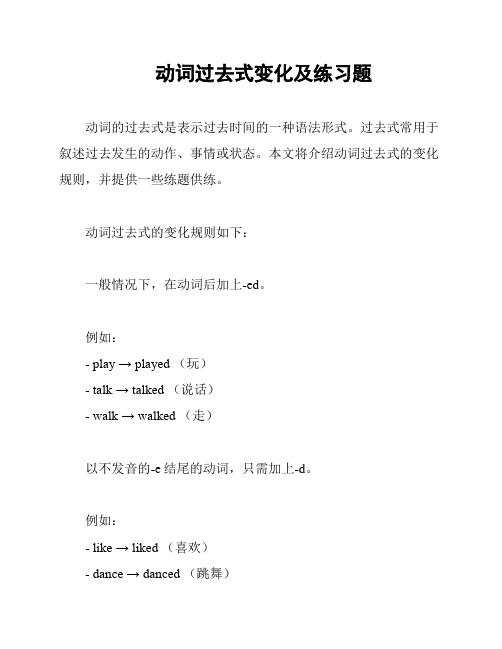
动词过去式变化及练习题动词的过去式是表示过去时间的一种语法形式。
过去式常用于叙述过去发生的动作、事情或状态。
本文将介绍动词过去式的变化规则,并提供一些练题供练。
动词过去式的变化规则如下:一般情况下,在动词后加上-ed。
例如:- play → played (玩)- talk → talked (说话)- walk → walked (走)以不发音的-e结尾的动词,只需加上-d。
例如:- like → liked (喜欢)- dance → danced (跳舞)- close → closed (关闭)以重读闭音节结尾的动词,且末尾只有一个辅音字母,则双写这个辅音字母后再加-ed。
例如:- stop → stopped (停止)- plan → planned (计划)- prefer → preferred (更喜欢)以下是一些练题供练动词过去式的变化:1. He ________ (watch) a movie last night.2. I ________ (study) English for two hours yesterday.3. She ________ (cook) dinner yesterday evening.4. They ________ (visit) their grandparents last weekend.5. We ________ (play) soccer in the park yesterday.参考答案:1. watched2. studied3. cooked4. visited5. played希望本文能帮助你掌握动词过去式的变化规则,加强对过去时态的理解。
练题可以帮助你巩固所学知识,提高动词过去式的运用能力。
(完整版)小学英语语法总结及练习题

小学英语语法总结及练习一、名词复数规则1.一般情况下,直接加-s,如:book-books, bag-bags, cat-cats, bed-beds2.以s. x. sh. ch结尾,加-es,如:bus-buses, box-boxes, brush-brushes, watch-watches 3.以“辅音字母y”结尾,变y为i, 再加-es,如:family-families, strawberry-strawberries 4.以“f或fe”结尾,变f或fe为v, 再加-es,如:knife-knives,leaf——leaves5.不规则名词复数:man-men, woman-women, policeman-policemen, policewoman-policewomen,child-children, foot-feet, tooth-teethfish-fish, deer-deer, sheep-sheep, people-people, Chinese-Chinese, Japanese-Japanese写出下列各词的复数I _________him _________this ___________her ______watch _______child _______photo ________diary ______day________ foot________ book_______ dress ________tooth_______sheep ______box_______ strawberry _____peach______ sandwich ______ dish_______bus_______man______ woman_______二、一般现在时一般现在时基本用法介绍:【No. 1】一般现在时的功能1.表示事物或人物的特征、状态。
如:The sky is blue.天空是蓝色的。
四年级英语动词过去式的变化规则练习题30题(答案解析)

四年级英语动词过去式的变化规则练习题30题(答案解析)1.I played football yesterday. “played”的原形是_____.A.playB.playsC.playing答案解析:A。
“played”是动词“play”的过去式,原形是“play”。
选项B“plays”是第三人称单数形式。
选项C“playing”是现在分词形式。
2.She watched TV last night. “watched”的原形是_____.A.watchB.watchesC.watching答案解析:A。
“watched”是动词“watch”的过去式,原形是“watch”。
选项B“watches”是第三人称单数形式。
选项C“watching”是现在分词形式。
3.He cleaned his room yesterday. “cleaned”的原形是_____.A.cleanB.cleansC.cleaning答案解析:A。
“cleaned”是动词“clean”的过去式,原形是“clean”。
选项B“cleans”是第三人称单数形式。
选项C“cleaning”是现在分词形式。
4.They listened to music yesterday. “listened”的原形是_____.A.listenB.listensC.listening答案解析:A。
“listened”是动词“listen”的过去式,原形是“listen”。
选项B“listens”是第三人称单数形式。
选项C“listening”是现在分词形式。
5.We visited our grandparents last weekend. “visited”的原形是_____.A.visitB.visitsC.visiting答案解析:A。
“visited”是动词“visit”的过去式,原形是“visit”。
选项B“visits”是第三人称单数形式。
小学语法规则动词的过去式及练习含答案

小学语法规则动词的过去式及练习一般过去时中的动词通常用动词的过去式形式来表示,而动词的过去式是在动词原形的基础上变化的。
动词的过去式可以分为规则动词过去式和不规则动词过去式。
一、规则动词的过去式变化如下:(1)一般情况下在动词原形后直接加-ed。
如:help→helped want→wanted work→workedact →acted look →looked call →calledopen→opened need →needed listen →listenedwash →washed(2)以不发音的字母e结尾的动词,直接加-d。
如:live→liveduse→usedlike→likedhope →hoped(3)以一个辅音字母结尾的重读闭音节动词,双写词尾辅音字母,再加-ed。
如: stop →stopped plan →planned fit →fitted(4)以辅音字母+y结尾的动词变y为i,再加-ed。
如:study→studied worry →worried try→triedcopy→copied cry→cried carry →carried(5)以元音字母加y结尾的词,直接加-ed。
如: play→played enjoy →enjoyedstay →stayed二、规则动词过去式的读音也有规律可循。
口诀:清后/t/,元浊/d/, /t//d/之后读/id/。
(1)清辅音/p//k//f/ /s/等后,ed要读/t/。
如:ask→asked /a:skt/cook→cooked /kukt/pass→passed /pa:st/(2)元音或浊辅音/b//g//v//z//m/等后,ed要读/d/。
如:move→moved /mu:vd/live →lived/livd/listen →listened //lisndstay→stayed /steid/(3)/t/或/d/后,ed读/id/。
(完整版)小学动词原形和过去式练习题

(完整版)小学动词原形和过去式练习题小学动词原形和过去式练题动词原形和过去式动词是表示行为或状态的词汇。
一般情况下,动词有原形和过去式两种形式。
原形表示现在或未来的动作,而过去式表示已经发生的动作。
练题1. 下面列举了一些动词,请写出它们的过去式:- 跑:- 吃:- 看:- 游泳:- 研究:2. 根据句子的上下文,填入适当的动词的过去式:- 昨天我(go)去公园了。
- 她昨天(sing)了一首歌。
- 我们上周(visit)了博物馆。
- 他们昨天(play)了足球。
3. 根据题意,从括号中选择适当的动词的过去式填空:- 他们昨天(do / did)他们的家庭作业。
- 昨天他(go / went)去看电影了。
- 她上周五(eat / ate)了一顿大餐。
- 我们昨天(see / saw)一部很有趣的电影。
4. 写出下列动词的原形:- ran:- ate:- saw:- swam:- went:5. 请把下列动词的原形改为过去式:- run:- eat:- see:- swim:- write:6. 根据图片的提示,填入动词的过去式:- He _____________ (ride) his bike yesterday.- They _____________ (dance) at the party last night. - She _____________ (paint) a picture last week.- We _____________ (sing) a song in the concert.7. 根据句子的上下文,将动词改为过去式:- I usually (have) breakfast at 7 AM. [had]- The cat (catch) the mouse. [caught]- They (help) their friend with homework. [helped]- We (watch) a movie last night. [watched]总结动词的原形和过去式是研究语言时的重要基础。
(完整word版)动词过去式变化及练习题
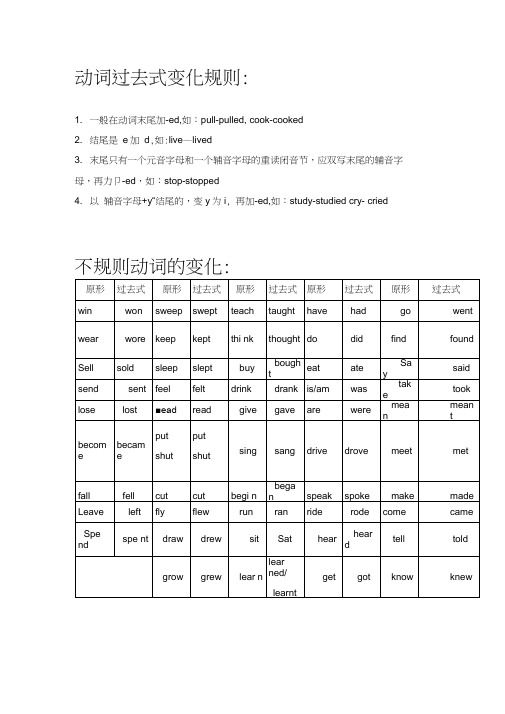
动词过去式变化规则:1. 一般在动词末尾加-ed,如:pull-pulled, cook-cooked2. 结尾是e加d,如:live—lived3. 末尾只有一个元音字母和一个辅音字母的重读闭音节,应双写末尾的辅音字母,再力卩-ed,如:stop-stopped4. 以辅音字母+y”结尾的,变y为i, 再加-ed,如:study-studied cry- cried 不规则动词的变化:1•写出下列动词的过去式is\am ________ fly ________ plant __________ are __________ drink ________ play ______ go _________ make __________ does ________ dance ________ worry ________ ask _______ t aste _______ eat __________ draw ________ put____ pass _ do —2. 用be动词的适当形式填空(过去时填空)1.1 ____ ______ at school just no w.2. He ________ ___ at the camp last week.3. We ___________ students two years ago.4. They _____________ on the farm a mome nt ago.5. Yang Ling _ ___ eleve n years old last year.6. There _______ an apple on the plate yesterday.7. There ___________ s ome milk in the fridge on Sun day.8. The book ______ on the sofa yesterday eve ning3. 选择填空1. Peter _______ in a small house four years ago. Now he ________ in a houseA.live , livesB. lives, livedC.lived, lives2. Amy __________ TV Yesterday.3. Amy is ______ TV Now.4. Amy ____ TV every day.A.watchedB.watchi ngC.watches5. Yesterday we ____________ some books.A.buyB.boughtC.buys6. He _____ a pupil . He ______ a pupil last yearA.wasB. wereC. isD.are7. There _________ a big house many years ago.A.wasB. wereC. isD.are4. 行为动词的过去时练习用行为动词的适当形式填空1. He _______ (live) in Wuxi two years ago.2. The cat _______ (eat) a bird last night.3. We ______ (have) a party last Halloween.4. Nancy _______ (pick) up oranges on the farm last week.5. I _______ (make) a model ship with Mike yesterday.6. They _____ (play) chess in the classroom last PE lesson.7. My mother ____ (cook) a nice food last Spring Festival.8. The girls _____ (sing) and ____ (dance) at the party.。
小学英语过去式讲解(附练习及答案)
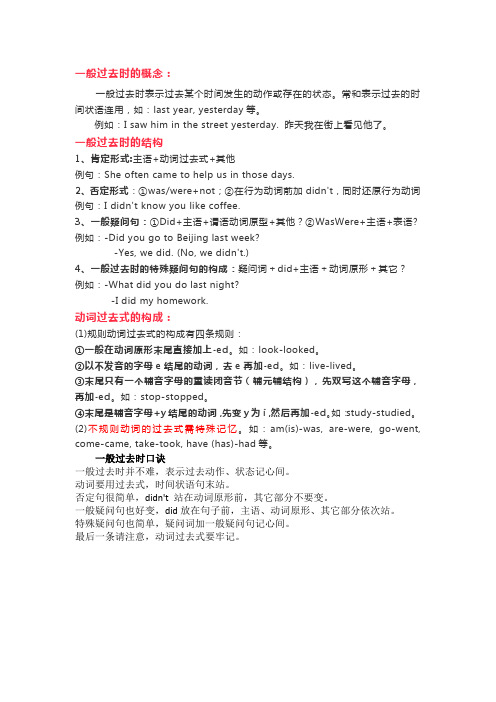
一般过去时的概念:一般过去时表示过去某个时间发生的动作或存在的状态。
常和表示过去的时间状语连用,如:last year, yesterday等。
例如:I saw him in the street yesterday. 昨天我在街上看见他了。
一般过去时的结构1、肯定形式:主语+动词过去式+其他例句:She often came to help us in those days.2、否定形式:①was/were+not;②在行为动词前加didn't,同时还原行为动词例句:I didn't know you like coffee.3、一般疑问句:①Did+主语+谓语动词原型+其他?②WasWere+主语+表语?例如:-Did you go to Beijing last week?-Yes, we did. (No, we didn't.)4、一般过去时的特殊疑问句的构成:疑问词+did+主语+动词原形+其它?例如:-What did you do last night?-I did my homework.动词过去式的构成:(1)规则动词过去式的构成有四条规则:①一般在动词原形末尾直接加上-ed。
如:look-looked。
②以不发音的字母e结尾的动词,去e再加-ed。
如:live-lived。
③末尾只有一个辅音字母的重读闭音节(辅元辅结构),先双写这个辅音字母,再加-ed。
如:stop-stopped。
④末尾是辅音字母+y结尾的动词,先变y为i,然后再加-ed。
如:study-studied。
(2)不规则动词的过去式需特殊记忆。
如:am(is)-was, are-were, go-went, come-came, take-took, have (has)-had等。
一般过去时口诀一般过去时并不难,表示过去动作、状态记心间。
动词要用过去式,时间状语句末站。
否定句很简单,didn't 站在动词原形前,其它部分不要变。
小学英语(1-6年级)语法总结及练习题
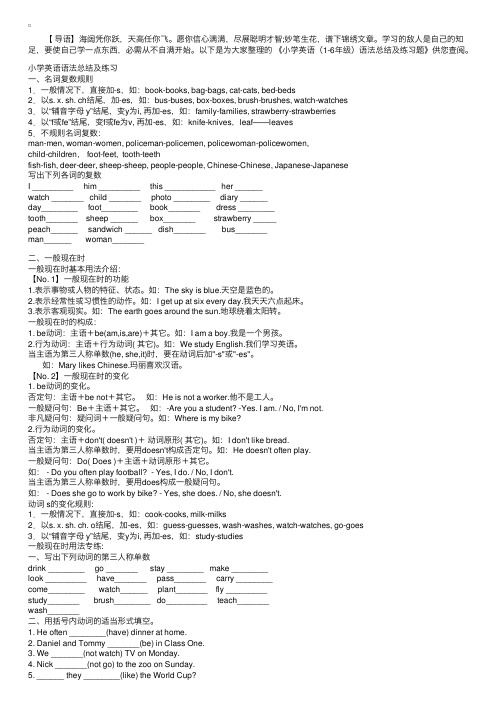
【导语】海阔凭你跃,天⾼任你飞。
愿你信⼼满满,尽展聪明才智;妙笔⽣花,谱下锦绣⽂章。
学习的敌⼈是⾃⼰的知⾜,要使⾃⼰学⼀点东西,必需从不⾃满开始。
以下是为⼤家整理的《⼩学英语(1-6年级)语法总结及练习题》供您查阅。
⼩学英语语法总结及练习⼀、名词复数规则1.⼀般情况下,直接加-s,如:book-books, bag-bags, cat-cats, bed-beds2.以s. x. sh. ch结尾,加-es,如:bus-buses, box-boxes, brush-brushes, watch-watches3.以“辅⾳字母 y”结尾,变y为i, 再加-es,如:family-families, strawberry-strawberries4.以“f或fe”结尾,变f或fe为v, 再加-es,如:knife-knives,leaf——leaves5.不规则名词复数:man-men, woman-women, policeman-policemen, policewoman-policewomen,child-children, foot-feet, tooth-teethfish-fish, deer-deer, sheep-sheep, people-people, Chinese-Chinese, Japanese-Japanese写出下列各词的复数I _________ him _________ this ___________ her ______watch _______ child _______ photo ________ diary ______day________ foot________ book_______ dress ________tooth_______ sheep ______ box_______ strawberry _____peach______ sandwich ______ dish_______ bus_______man______ woman_______⼆、⼀般现在时⼀般现在时基本⽤法介绍:【No. 1】⼀般现在时的功能1.表⽰事物或⼈物的特征、状态。
(完整版)动词过去式练习题

小学英语语法动词过去式练习一、写出下列动词的过去式isam_________ fly_______ plant________ are ________drink_________play_______ go________ make ________does_________ dance________worry________ ask _____taste_________ eat__________ draw________put ______ throw________ kick_________ pass_______ do ________二、用be动词的适当形式填空1. I ______ an English teacher now.2. She _______ happy yesterday.3. They _______ glad to see each other last month.4. Helen and Nancy ________ good friends.5. The little dog _____ two years old this year.6. Look, there ________ lots of grapes here.7. There ________ a sign on the chair on Monday..8. Today _____ the second of June. Yesterday ______ the first of June. It _____ Children’s Day. All the students ______ very excited.9. There ________ some milk in the fridge on Sunday.10. The mobile phone _______ on the sofa yesterday evening.三、用行为动词的适当形式填空1.He _____ (live) in Wuxi two years ago.2.The cat ______ (eat) a bird last night.3. We _______ (have) a party last Halloween.4. Nancy ________ (pick) up oranges on the farm last week.5. I ________ (make) a model ship with Mike yesterday.6. They ________ (play) chess in the classroom last PE lesson.7. My mother _______ (cook) a nice food last Spring Festival.8. The girls ________ (sing) and _______ (dance) at the party.9. He ________ (jump) high on last Sports Day.10. She likes ______ newspapers, but she ______ a book yesterday. (read)四、句型转换1. It was exciting.否定句:__________________________________________ 一般疑问句:____________________肯、否定回答:____________________2.All the students were very excited.3.否定句:___________________________一般疑问句:____________________________________________肯、否定回答:__________________________________________3. They were in his pocket. 否定句:___________________________________一般疑问句:____________________________________________肯、否定回答:__________________________________________4. There was a car in front of the house just now.否定句:________________________________________________一般疑问句:____________________________________________肯、否定回答:__________________________________________5. Su Hai took some photos at the Sports day.否定句:________________________________________________一般疑问句:____________________________________________肯、否定回答:__________________________________________6. Nancy went to school early. 否定句:________________________________一般疑问句:____________________________________________肯、否定回答:__________________________________________7. We sang some English songs. 否定句:_______________________________一般疑问句:____________________________________________肯、否定回答:__________________________________________8. They played football in the playground.否定句:________________________________________________一般疑问句:____________________________________________肯、否定回答:__________________________________________一般过去式练习题I. 一般过去时的概念一般过去时表示过去某个时间发生的动作或存在的状态。
(完整版)小学英语动词过去式变化总结及练习题(最新整理)

直接加 edwalk 走climb 爬turn 转弯learn 学习cook dinner 做饭play the piano 弹钢琴visit grandparents 看望(外)祖父母clean the bedroom 打扫卧室wash the clothes 洗衣服answer the phone 接电话listen to music 听音乐clean the room 打扫房间jump 跳row 划work 工作show 展示look 看help 帮助relax 放松return 归还pass 传递watch TVpick up leaves 采摘树叶paint 绘画kick 踢ski 滑雪直接加 dlike 像,喜欢live 居住dance 跳舞use a computer 使用计算机love 爱taste 尝close 关上prepare 准备不规则变化eat 吃have 有;吃buy 买take 买;带go 去sing 唱歌teach(taught)教run(ran)跑fight(fought)打架get up 起床swim 游泳fly 飞swing(swung)荡sleep(slept)睡觉sweep(swept) the floor 扫地do 做make the bed 铺床draw(drew) pictures 画画write(wrote) a letter 写信catch (caught)butterflies 捉蝴蝶meet(met)见面drink(drank)喝tell(told)告诉ride(rode)骑find(found)寻找到drive(drove)驾驶come(came)来become(became)变成feel(felt)感觉到think(thought)思考meet(met)遇见fall(fell)落下leave 离开wake(woke) up 醒来bring 带来is am are see 看到grow 种植grew stand(stood)站立词形不变read books 读书put 放set the table 摆饭桌hit (hit)撞击、打cut 切、割最后一个字母双写再加 edstop(stopped)停shop 购物把 y 变成 i 再加 edempty the trash 倒垃圾一、单项选择( ) 1. The girl a red sweater is duty today.A. in, onB. in, inC. on, inD. on, on( ) 2. It’s very cold, your coat, please, Kate.A. put offB. put onC. puts onD. put in( ) 3. —— What day is today?—— It's .A. MondayB. a fine dayC. September 1stD. weekday ( ) 4. Shall we home?A. goB. goingC. goesD. went( ) 5. How much is the hot dog?A. TwoB. Three dollarsC. Four hot dogsD. Very much ( ) 6. Whose book is it? It’s not book, It’sA. my ,herB. mine ,hersC. My , hersD.mine,she二、阅读下面短文,选出最佳选项,将其序号填入提前括号内。
小学英语过去式练习汇总附答案
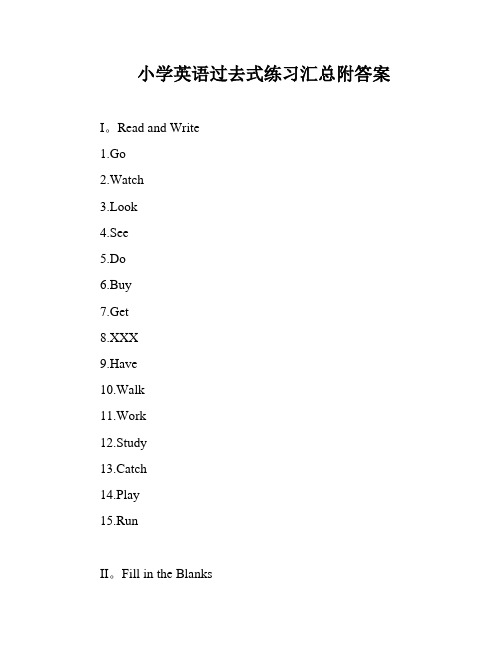
小学英语过去式练习汇总附答案I。
Read and Write1.Go2.Watch3.Look4.See5.Do6.Buy7.Get8.XXX9.Have10.Walk11.Work12.Study13.Catch14.Play15.RunII。
Fill in the Blanks1.Robert wants to buy a pair of shoes.2.Do you like painting?3.My English teacher does not have three lessons every day.4.How do you go to school。
On foot.5.Ken does some washing every day.6.Miss Li teaches us music.7.Have your friends got any pets?8.Tom and Danny always help Granny Wang clean her room.9.XXX.10.The Wangs drive to the XXX at XXX.11.What do you need for the ic?12.XXX XXX a skilled runner.13.What does your uncle prefer to drink?14.XXX。
XXX.15.We have a party every month as a n.1.XXX?2.Listen。
who is singing in the music room?3.Do your homework now。
Kally.4.Super dog sees the fire.5.XXX.6.The zoo-keeper works in the zoo.7.The students are having a XXX.8.What are you doing on Saturday。
(完整版)小学英语动词过去式变化总结及练习题

(完整版)小学英语动词过去式变化总结及练习题直接加edwalk走____________ climb爬_____________turn转弯____________ learn学习_____________cook dinner做饭____________ play the piano弹钢琴____________ visit grandparents看望(外)祖父母__________________________ clean the bedroom打扫卧室__________________________wash the clothes洗衣服__________________________answer the phone接电话__________________________listen to music听音乐__________________________clean the room打扫房间__________________________jump跳____________ row划____________ work工作____________ show展示____________ look看____________ help帮助____________ relax放松___________ return 归还_____________ pass传递______________ watch TV _____________________________________ pick up leaves采摘树叶___________________________________paint绘画______________ kick踢______________ ski 滑雪______________ 直接加dlike像,喜欢______________ live居住______________dance跳舞______________ use a computer使用计算机______________love爱______________ taste尝______________close关上______________ prepare准备_____________不规则变化eat吃____________ have有;吃____________ buy买____________ take买;带____________ go去____________ sing唱歌____________ teach(taught)教run(ran)跑fight(fought)打架get up起床____________ swim游泳____________ fly飞____________ swing(swung)荡sleep(slept)睡觉sweep(swept) the floor扫地do做____________ make the bed铺床____________draw(drew) pictures画画write(wrote) a letter写信catch(caught)butterflies捉蝴蝶meet(met)见面drink(drank)喝tell(told)告诉ride(rode)骑find(found)寻找到drive(drove)驾驶come(came)来become(became)变成feel(felt)感觉到think(thought)思考meet(met)遇见fall(fell)落下leave离开_____________ wake(woke) up醒来bring带来____________ is___________ am___________ are____________ see看到_________ grow 种植grew stand(stood)站立词形不变read books读书__________________ put放__________________set the table摆饭桌__________________ hit (hit)撞击、打cut 切、割_______ 最后一个字母双写再加edstop(stopped)停shop购物__________________把y变成i再加edempty the trash倒垃圾__________________一、单项选择( ) 1. The girl ____a red sweater is ______duty today.A. in, onB. in, inC. on, inD. on, on( ) 2. It’s very cold, _____your coat, please, Kate.A. put offB. put onC. puts onD. put in( ) 3. —— What day is today?—— It's ______.A. MondayB. a fine dayC. September 1stD. weekday ( ) 4. Shall we ______home?A. goB. goingC. goesD. went( ) 5. How much is the hot dog?A. TwoB. Three dollarsC. Four hot dogsD. Very much( ) 6. Whose book is it? It’s not ___ book, It’s ____A. my ,herB. mine ,hersC. My , hersD.mine,she二、阅读下面短文,选出最佳选项,将其序号填入提前括号内。
动词过去式变化规则及其练习(含答案)
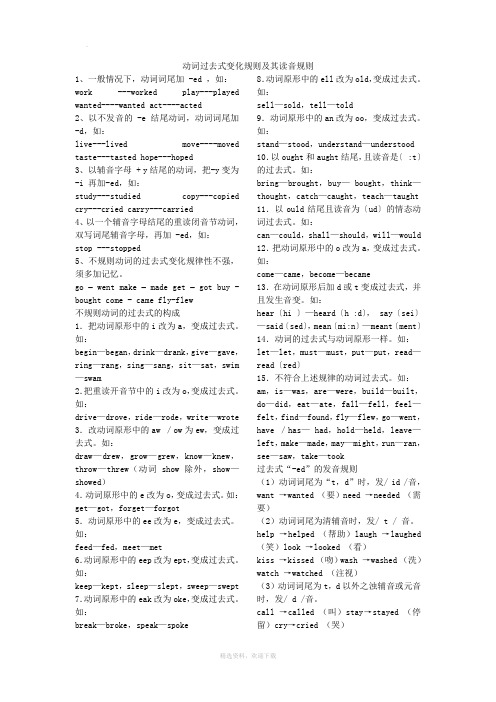
动词过去式变化规则及其读音规则1、一般情况下,动词词尾加 -ed ,如:work ---worked play---played wanted----wanted act----acted2、以不发音的 -e 结尾动词,动词词尾加-d,如:live---lived move----moved taste---tasted hope---hoped3、以辅音字母 + y结尾的动词,把-y变为-i 再加-ed,如:study---studied copy---copied cry---cried carry---carried4、以一个辅音字母结尾的重读闭音节动词,双写词尾辅音字母,再加 -ed,如:stop ---stopped5、不规则动词的过去式变化规律性不强,须多加记忆。
go – went make – made get – got buy - bought come - came fly-flew不规则动词的过去式的构成1.把动词原形中的i改为a,变成过去式。
如:begin—began,drink—drank,give—gave,ring—rang,sing—sang,sit—sat,swim —swam2.把重读开音节中的i改为o,变成过去式。
如:drive—drove,ride—rode,write—wrote 3.改动词原形中的aw /ow为ew,变成过去式。
如:draw—drew,grow—grew,know—knew,throw—threw(动词show除外,show—showed)4.动词原形中的e改为o,变成过去式。
如:get—got,forget—forgot5.动词原形中的ee改为e,变成过去式。
如:feed—fed,meet—met6.动词原形中的eep改为ept,变成过去式。
如:keep—kept,sleep—slept,sweep—swept 7.动词原形中的eak改为oke,变成过去式。
动词过去式变化及练习题
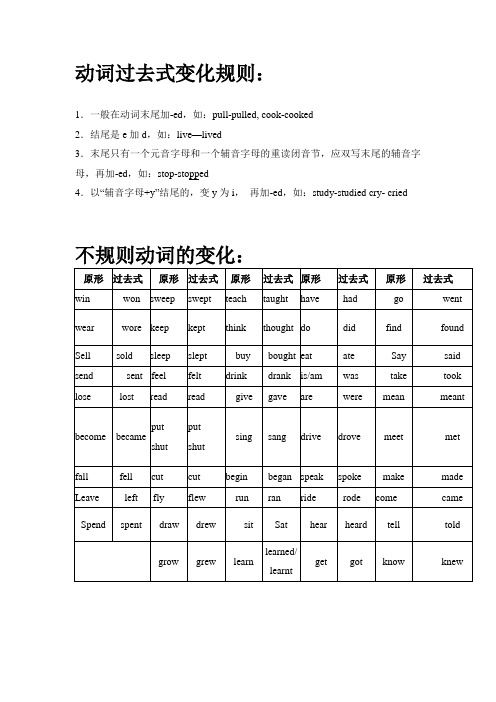
动词过去式变化规则:1.一般在动词末尾加-ed,如:pull-pulled, cook-cooked2.结尾是e加d,如:live—lived3.末尾只有一个元音字母和一个辅音字母的重读闭音节,应双写末尾的辅音字母,再加-ed,如:stop-stopped4.以“辅音字母+y”结尾的,变y为i,再加-ed,如:study-studied cry- cried 不规则动词的变化:1.写出下列动词的过去式is\am_________ fly_______ plant________ are ________drink_________ play_______ go________ make _______does_________ dance________ worry________ ask _____taste_________ eat__________ draw________ put _____pass_______ do ________2.用be动词的适当形式填空(过去时填空)1. I ____ ___ at school just now.2. He ____ ____ at the camp last week.3. We ___ _____ students two years ago.4. They ____ ____ on the farm a moment ago.5. Yang Ling ___ _____ eleven years old last year.6. There ________ an apple on the plate yesterday.7. There ___ _____ some milk in the fridge on Sunday.8. The book _______ on the sofa yesterday evening3.选择填空1.Peter in a small house four years ago. Now he in a houseA.live,livesB. lives, livedC.lived, lives2.Amy TV Yesterday.3. Amy is TV Now.4. Amy TV every day.A.watchedB.watchingC.watches5.Yesterday,we some books.A.buyB.boughtC.buys6.He a pupil . He a pupil last yearA.wasB. wereC. isD.are7.There a big house many years ago.A.wasB. wereC. isD.are4.行为动词的过去时练习用行为动词的适当形式填空1. He _________ (live) in Wuxi two years ago.2. The cat ________ (eat) a bird last night.3. We _______ (have) a party last Halloween.4. Nancy ________ (pick) up oranges on the farm last week.5. I ________ (make) a model ship with Mike yesterday.6. They ______ (play) chess in the classroom last PE lesson.7. My mother _____ (cook) a nice food last Spring Festival.8. The girls ______ (sing) and _____ (dance) at the party.。
- 1、下载文档前请自行甄别文档内容的完整性,平台不提供额外的编辑、内容补充、找答案等附加服务。
- 2、"仅部分预览"的文档,不可在线预览部分如存在完整性等问题,可反馈申请退款(可完整预览的文档不适用该条件!)。
- 3、如文档侵犯您的权益,请联系客服反馈,我们会尽快为您处理(人工客服工作时间:9:00-18:30)。
直接加ed
walk走____________ climb爬_____________
turn转弯____________ learn学习_____________
cook dinner做饭____________ play the piano弹钢琴____________
visit grandparents看望(外)祖父母__________________________
clean the bedroom打扫卧室__________________________
wash the clothes洗衣服__________________________
answer the phone接电话__________________________
listen to music听音乐__________________________
clean the room打扫房间__________________________
jump跳____________ row划____________ work工作____________
show展示____________ look看____________ help帮助____________
relax放松___________ return 归还_____________ pass传递______________ watch TV _____________________________________
pick up leaves采摘树叶___________________________________
paint绘画______________ kick踢______________ ski 滑雪______________ 直接加d
like像,喜欢______________ live居住______________
dance跳舞______________ use a computer使用计算机______________
love爱______________ taste尝______________
close关上______________ prepare准备_____________
不规则变化
eat吃____________ have有;吃____________ buy买____________ take买;带____________ go去____________ sing唱歌____________ teach(taught)教run(ran)跑fight(fought)打架
get up起床____________ swim游泳____________ fly飞____________ swing(swung)荡sleep(slept)睡觉sweep(swept) the floor扫地do做____________ make the bed铺床____________
draw(drew) pictures画画write(wrote) a letter写信
catch(caught)butterflies捉蝴蝶meet(met)见面
drink(drank)喝tell(told)告诉ride(rode)骑find(found)寻找到drive(drove)驾驶come(came)来become(became)变成feel(felt)感觉到think(thought)思考meet(met)遇见fall(fell)落下leave离开_____________ wake(woke) up醒来bring带来____________ is___________ am___________ are____________ see看到_________ grow种植grew stand(stood)站立
词形不变
read books读书__________________ put放__________________
set the table摆饭桌__________________ hit (hit)撞击、打cut 切、割_______ 最后一个字母双写再加ed
stop(stopped)停shop购物__________________
把y变成i再加ed
empty the trash倒垃圾__________________
一、单项选择
( ) 1. The girl ____a red sweater is ______duty today.
A. in, on
B. in, in
C. on, in
D. on, on
( ) 2. It’s very cold, _____your coat, please, Kate.
A. put off
B. put on
C. puts on
D. put in
( ) 3. —— What day is today?
—— It's ______.
A. Monday
B. a fine day
C. September 1st
D. weekday ( ) 4. Shall we ______home?
A. go
B. going
C. goes
D. went
( ) 5. How much is the hot dog?
A. Two
B. Three dollars
C. Four hot dogs
D. Very much
( ) 6. Whose book is it? It’s not ___ book, It’s ____
A. my ,her
B. mine ,hers
C. My , hers
D.mine,she
二、阅读下面短文,选出最佳选项,将其序号填入提前括号内。
My father __ 1____ a good friend in the factory (工厂). He is sixty. He is an old man. All of the children like him. We call ____2___ Uncle Sam. He
__3___ from England. He ___4___ in Sichuan. He can’t __5____ Chinese. We teach(教) him Chinese ___6_he ___7_ us English. He ___8____ work __9_ Sundays. He __10___ making things. And he likes watching TV with his children at night.
( )1. A. have B. haves C. has D. is
( )2. A. he B. they C. him D. his
( )3. A. come B. comes C. goes D. to come
( )4. A. live B. living C. lives D. to live
( )5. A. speak B. tell C. say D. talk
( )6. A or B.but C.and D.until
( )7. A. teach B. teachs C.teaches D.teaching
( )8. A. do B. don’t C. does D. doesn’t
( )9.A.in B.on C.for D.of
( )10. A .likes B. like C. to like D. liking
六、(1)C (2)C (3)B (4)C (5)A (6)C (7)C (8)D (9)B (10)A
三、仔细阅读,判断下列句子是否正确。
正确写T,错误写F。
The Whites always get up early every day. In the morning father always goes to work. Sandy and Sue always go to school. Mother usually stays at home. At noon, Sandy and Sue always have lunch at school. In
the afternoon, Sandy and Sue come from school. They usually arrive home early. In the evening, Sandy and Sue always do their homework. At night, they go to bed early, but it's difficult for them to fall asleep. ( ) 1 The Whites mean all the members of Mr White's family.
( ) 2 Sandy is Mr White's daughter and Sue is his son.
( ) 3 Mr White, Sandy and Sue leave home in the morning except Mrs White.
( ) 4 Sandy and Sue can get home early in the afternoon.
( ) 5 Sandy and Sue like sleeping。
